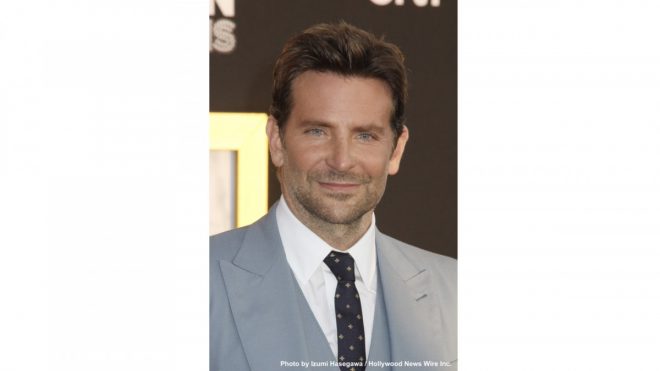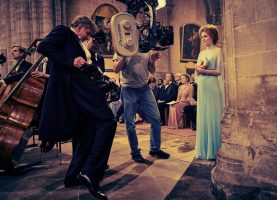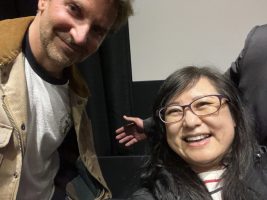By: Izumi Hasegawa February 2, 2024

Bradley Cooper did it again. He directed and starred in Maestro like his Oscar award winning film, A Star is Born, that created a buzz in 2018. In this movie, he faced new and even bigger challenges, such as conducting an orchestra and wearing heavy make-up (I predict Kazu Hiro will be the winner of the Academy Awards (R) again for his fantastic work in this film transforming Bradley Cooper into Leonard Bernstein).

Q: If you could pinpoint one of the most challenging, yet satisfying moments, throughout the production of the film, what would it be?
BC: I mean, the truth is there was one that I really didn’t have fear at all any day, namely because Carey was with me, but the Ely Cathedral scene where he’s conducting was terrifying. I mean, it was, and really terrifying, because you know when some people say like, “It’s okay if you mess it up” It’s like, “Yeah, it’s gonna be okay.” It’s like, “No, actually, if I mess that up, the whole movie doesn’t work.” Because you’re going like,”He’s not a good conductor. What’s everybody talking about? Why is she staying with me?” I don’t see him standing in the center of the sun, and that’s me conducting the London Symphony Orchestra, and that’s six minutes and 21 or 23 seconds of music, that luckily I had Gustavo Dudamel and Yannick Seguin who were kind enough for years to teach me it, and I had the video of him conducting that orchestra in the ’70s in that space. But even with all that, conducting is impossible. And so the first day I messed up, I kept getting behind tempo, I was forgetting where in the time change happened, and it was that moment where you’re like, “I can’t believe it’s actually, I’m messing it up,” in front of the greatest in the world. I mean, London Symphony Orchestra, top three orchestras in the world, and then the minute you think that people aren’t believing you, and then by the way, I’m also Lanny, so I’m like, “Well, then they don’t think I’m Lanny.”
 It all starts, you know, that feeling when you, I mean, it was horrible. I went to bed, texted Steven Morrow, the sound mixer, “Do we have it? If you’re texting the sound mixer, and you’re the director, if we have the scene, you’re in trouble,” and he wrote back like, “I think we have it,” and I knew we didn’t. And because I had the luxury of being so early to set the next day, it was an empty cathedral. I walked in, and I knew, I was actually shooting it improperly. I was shooting it out of fear. I had so many setups, which the movie doesn’t have, out of fear that I was going to mess it up. But the truth is, the scene was only about Felicia coming to see him and seeing that there is no hate in his heart. And that’s what the scene’s about. So I was like, “So then he’s got to conduct it.” So everybody waited and I brought in the techno crane and I created this one shot. I asked everybody back in. I actually said a prayer in front of everybody, too, Lenny, thanking him, actually. Not asking for anything, thanking them. And we did it one more time. And that’s what’s in the movie. And I did conduct them. And it was crazy. It was crazy. And actually the tympanist, the drummer in the back, came running up. I remember we were all sort of late and he said, “Sorry, excuse me. Yesterday, you totally fucked that up. You know that, right?” He said, “You did not conduct us yesterday. We were very good, so we’re fine. But today, you just conducted us and you have to use that.” And I said, “No, no, no. We’re going to use it.” He goes, “You can’t use yesterday.” I was like, “No, no, no. I know. I know.”
It all starts, you know, that feeling when you, I mean, it was horrible. I went to bed, texted Steven Morrow, the sound mixer, “Do we have it? If you’re texting the sound mixer, and you’re the director, if we have the scene, you’re in trouble,” and he wrote back like, “I think we have it,” and I knew we didn’t. And because I had the luxury of being so early to set the next day, it was an empty cathedral. I walked in, and I knew, I was actually shooting it improperly. I was shooting it out of fear. I had so many setups, which the movie doesn’t have, out of fear that I was going to mess it up. But the truth is, the scene was only about Felicia coming to see him and seeing that there is no hate in his heart. And that’s what the scene’s about. So I was like, “So then he’s got to conduct it.” So everybody waited and I brought in the techno crane and I created this one shot. I asked everybody back in. I actually said a prayer in front of everybody, too, Lenny, thanking him, actually. Not asking for anything, thanking them. And we did it one more time. And that’s what’s in the movie. And I did conduct them. And it was crazy. It was crazy. And actually the tympanist, the drummer in the back, came running up. I remember we were all sort of late and he said, “Sorry, excuse me. Yesterday, you totally fucked that up. You know that, right?” He said, “You did not conduct us yesterday. We were very good, so we’re fine. But today, you just conducted us and you have to use that.” And I said, “No, no, no. We’re going to use it.” He goes, “You can’t use yesterday.” I was like, “No, no, no. I know. I know.”

Q: What lessons did you learn from your experience working on A Star Is Born? Were you able to cultivate and craft that into Maestro?
BC: I learned so much making that film and then also shooting Nightmare Alley after that with Guillermo del Toro and then Licorice Pizza with Paul Thomas Anderson. He was kind enough to let me be a part of his prep and I spent three weeks with him just looking at lenses, watching camera tests, just soaking up everything I could. Guillermo, his use of the techno crane, I completely inhabited and utilized for this film. And so A Star Is Born, each project I’ve ever been involved with, I’ve just soaked up everything I can and I think hopefully I’ve just kept evolving as a filmmaker. So you know A Star Is Born, more than anything maybe is the fact that I felt like is that I found something that feels like this is exactly what I’m supposed to do. That’s my major takeaway from A Star Is Born was oh wow I think this is, I finally have found my center as an artist.

Q: The movie opens with a quote “A work of art does not answer questions, it provokes them.” And that quote really framed the movie. There’s a scene where Felicia ends one of her dialogues with “any questions?” and then the film ends with Lenny saying, “any questions?” so that obviously was like a theme. Could you talk about that theme and that framework and what that meant to you in making the film?
BC: Yeah it’s the whole reason why I made. The whole reason why I wanted to make the film was that this is something that I haven’t. This is a relationship that in researching it, I realized they really were that they’re both true loves of their life and wow and such a sort of unorthodox way of what we think about a marriage and a relationship. And knowing that to be honest to their relationship and to Lenny it was going to be complicated and that came to me late that quote, but I felt that it was important for number one, just for the audience to see the name Leonard Bernstein at the beginning too, I thought and just to see what a thoughtful person he was throughout his entire life and his writings also as well as all the other things that he did. And I just I came across that I would always sort of go back and read stuff of his every all the time through making the movie and I just thought oh that would be great the beginning. Now, “any questions,’ the reason why that’s in there is because that’s how Candide ends. That’s the last line of Candide. The opera wrote, “It’s any questions.” So that’s why I thought it was sort of, you know, wonderful to have Felicia say that, and then for Lenny to say that, and say it in different, both of, in my mind, I don’t know how, but both of them in a sort of like, like, any questions, but also like got a problem with that?, is sort of how they’re both saying it. And there’s a humor, you know, there’s a, that’s part of Lenny, you know, this whole thing. Any questions? You know, I just sort of thought, that’s how the movie has to end.

Maestro is now playing in theaters and streaming platforms.
Edited by Seana Magee
